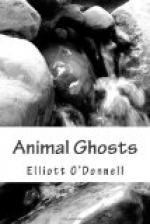There is a house in Great Russell Street, W.C., where the hauntings take the form of a magpie that taps at one of the windows every morning between two and three, and then appears inside the room, perched on what looks like a huge alpine stick, suspended horizontally in the air, about seven feet from the floor. The moment a sound is made the apparition vanishes. It is thought to be the spirit of a magpie that was done to death in a very cruel manner in that room many years ago. There is a story current to the effect that a lady, when visiting the British Museum one day, happened to pass some slighting remark about one of the Egyptian mummy cases (not the notorious one), and that on quitting the building she felt a sharp peck on her neck. She put up her hand to the injured part, and felt the distinct impression of a bird’s claw on it. She could see nothing, however. That night—and for every succeeding night for six weeks—she was awakened at two o’clock by the phantom of an enormous magpie that fluttered over the bed, and was clearly visible to herself and her sister. The phenomenon worried her so that she became ill, and was eventually ordered abroad. She went to Cairo and enjoyed a brief respite; the hauntings, however, began again, and this time became so persistent that she at last lost her reason, and had to be brought home and confined in a private asylum, where she shortly afterwards died. Though I cannot vouch for the truth of this story, I do think it is somewhat risky to make fun of certain of the Egyptian relics in the Museum. They may be haunted by something infinitely more alarming than the ghosts of magpies. There are many sayings respecting the magpie as a harbinger of ill luck. In Lancashire, for example, there is this rhyme:
“One for anger,
two for mirth,
Three for a wedding,
four for a birth,
Five for rich, six for
poor,
Seven for a witch, I
dare tell you no more.”
From further north comes this couplet:
“Magpie, magpie,
chatter and flee,
Turn up thy tail, and
good luck fall me.”
Rooks, again, are very psychic birds; they always leave their haunts near an old house shortly before a death takes place in it, because their highly developed psychic faculty of scent enables them to detect the advent of the phantom of death, of which they have the greatest horror. A rook is of great service, when investigating haunted houses, as it nearly always gives warning of the appearance of the Unknown by violent flappings of the wings, loud croaking, and other unmistakable symptoms of terror.
Owls, though no less sensitive to superphysical influence, are not scared by it; they and bats, alone among the many kinds of animals I have tested, take up their abode in haunted localities, and with the utmost sang-froid appear to enjoy the presence of the Unknown, even in its most terrifying form.
The owl has been associated with the darker side of the Unknown longer than any other bird.




